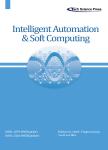Modified Elite Opposition-Based Artificial Hummingbird Algorithm for Designing FOPID Controlled Cruise Control System
作者机构:Computer Science DepartmentPrince Hussein Bin Abdullah Faculty for Information TechnologyAl al-Bayt UniversityMafraq25113Jordan Department of Electrical and Computer EngineeringLebanese American UniversityByblos13-5053Lebanon Hourani Center for Applied Scientific ResearchAl-Ahliyya Amman UniversityAmman19328Jordan Applied Science Research CenterApplied Science Private UniversityAmman11931Jordan School of Computer SciencesUniversiti Sains MalaysiaPulau Pinang11800Malaysia School of Engineering and TechnologySunway University MalaysiaPetaling Jaya27500Malaysia Department of Computer EngineeringBatman UniversityBatman72100Turkey MEU Research UnitMiddle East UniversityAmmanJordan Sorbonne Center of Artificial IntelligenceSorbonne University-Abu DhabiAbu DhabiUnited Arab Emirates
出 版 物:《Intelligent Automation & Soft Computing》 (智能自动化与软计算(英文))
年 卷 期:2023年第38卷第11期
页 面:169-183页
学科分类:07[理学] 0701[理学-数学] 070101[理学-基础数学]
主 题:Cruise control system FOPID controller artificial hummingbird algorithm elite opposition-based learning
摘 要:Efficient speed controllers for dynamic driving tasks in autonomous vehicles are crucial for ensuring safety and *** study proposes a novel approach for designing a fractional order proportional-integral-derivative(FOPID)controller that utilizes a modified elite opposition-based artificial hummingbird algorithm(m-AHA)for optimal parameter *** approach outperforms existing optimization techniques on benchmark functions,and we demonstrate its effectiveness in controlling cruise control systems with increased flexibility and *** study contributes to the advancement of autonomous vehicle technology by introducing a novel and efficient method for FOPID controller design that can enhance the driving experience while ensuring safety and *** highlight the significance of our findings by demonstrating how our approach can improve the performance,safety,and reliability of autonomous *** study’s contributions are particularly relevant in the context of the growing demand for autonomous vehicles and the need for advanced control techniques to ensure their safe *** research provides a promising avenue for further research and development in this area.



